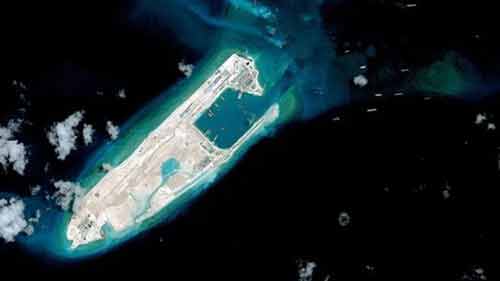Thailand’s media opposes China’s test flights
Wednesday, 08:32, 13/01/2016
Thailand’s media has raised strong objections to China’s test landing of planes on an airstrip illegally built on Chu Thap (Fiery Cross) Reef in Vietnam’s Truong Sa (Spratly) archipelago, saying this action escalates tensions and instabilities in the region.
The country’s media also called on the Association of Southeast Asian Nations (ASEAN) to unite with each other to prevent the situation from getting more complicated.
Bangkok Post on January 12, ran an article titled “Unnecessary flight risks” saying China’s claims over almost the entire East Sea backed by “dubious historical references” is “impossible to accept”.
The article said China must bear the responsibility for creating and maintaining unnecessary and indeed risky conflicts.
The problem boils down to China’s creation of artificial islands within the Truong Sa archipelago. The immediate danger, however, is China’s flights to and from the areas occupied illegally by the country in the archipelago, the article stated.
It also affirmed the Civil Aviation Authority of Vietnam (CAAV) statement that Chinese flights “threaten the safety of all flights in the region” as the Chinese flights involved go through busy airspace used by scores of airlines from dozens of countries.
Every aircraft that flies without giving public notice puts all flights in danger. It is a terrible decision by China, and should be immediately reversed, the article said.
 This is the sort of situation where the new ASEAN Community will show its desire and ability to act. ASEAN should approach China as a group, to press Beijing to resume proper air safety standards, it suggested.
This is the sort of situation where the new ASEAN Community will show its desire and ability to act. ASEAN should approach China as a group, to press Beijing to resume proper air safety standards, it suggested.
In an article issued the same day, The Nation also called on ASEAN to play a more active role in seeking a solution to maintaining peace and stability in the region.
ASEAN has adopted mechanisms to deal with maritime disputes, including the Declaration on the Conduct of Parties in the East Sea, signed with China in 2002.
However, the document is non-binding. ASEAN members are now negotiating on a binding Code of Conduct of Parties in the East Sea.
The article called on relevant parties to seek a diplomatic solution lest regional disputes escalate into armed conflicts.
On January 2 and 6, China conducted test flights on an airstrip illegally built on Chu Thap (Fiery Cross) Reef in Vietnam’s Truong Sa (Spratly) archipelago.
Responding to this act, Vietnamese Foreign Minister Spokesperson Le Hai Binh on January 2 said, the act seriously violates Vietnam’s sovereignty over Truong Sa archipelago and runs counter to the common perception reached by the two countries’ high-ranking leaders, the agreement on basic principles guiding the settlement of Vietnam – China issues at sea, and the spirit of the 2002 Declaration on the Conduct of Parties in the East Sea.
It has undermined peace and stability in the East Sea, eroded bilateral political trust and negatively impacted the neighbourliness and good sentiments between the two peoples, he added.
Vietnam resolutely protests against China’s pilot flights and asks the country to immediately end, and not repeat such an action, and take practical and specific acts to contribute to maintaining peace, stability, security, maritime and aviation safety and freedom in the East Sea, Binh said.
Bangkok Post on January 12, ran an article titled “Unnecessary flight risks” saying China’s claims over almost the entire East Sea backed by “dubious historical references” is “impossible to accept”.
The article said China must bear the responsibility for creating and maintaining unnecessary and indeed risky conflicts.
The problem boils down to China’s creation of artificial islands within the Truong Sa archipelago. The immediate danger, however, is China’s flights to and from the areas occupied illegally by the country in the archipelago, the article stated.
It also affirmed the Civil Aviation Authority of Vietnam (CAAV) statement that Chinese flights “threaten the safety of all flights in the region” as the Chinese flights involved go through busy airspace used by scores of airlines from dozens of countries.
Every aircraft that flies without giving public notice puts all flights in danger. It is a terrible decision by China, and should be immediately reversed, the article said.

In an article issued the same day, The Nation also called on ASEAN to play a more active role in seeking a solution to maintaining peace and stability in the region.
ASEAN has adopted mechanisms to deal with maritime disputes, including the Declaration on the Conduct of Parties in the East Sea, signed with China in 2002.
However, the document is non-binding. ASEAN members are now negotiating on a binding Code of Conduct of Parties in the East Sea.
The article called on relevant parties to seek a diplomatic solution lest regional disputes escalate into armed conflicts.
On January 2 and 6, China conducted test flights on an airstrip illegally built on Chu Thap (Fiery Cross) Reef in Vietnam’s Truong Sa (Spratly) archipelago.
Responding to this act, Vietnamese Foreign Minister Spokesperson Le Hai Binh on January 2 said, the act seriously violates Vietnam’s sovereignty over Truong Sa archipelago and runs counter to the common perception reached by the two countries’ high-ranking leaders, the agreement on basic principles guiding the settlement of Vietnam – China issues at sea, and the spirit of the 2002 Declaration on the Conduct of Parties in the East Sea.
It has undermined peace and stability in the East Sea, eroded bilateral political trust and negatively impacted the neighbourliness and good sentiments between the two peoples, he added.
Vietnam resolutely protests against China’s pilot flights and asks the country to immediately end, and not repeat such an action, and take practical and specific acts to contribute to maintaining peace, stability, security, maritime and aviation safety and freedom in the East Sea, Binh said.
